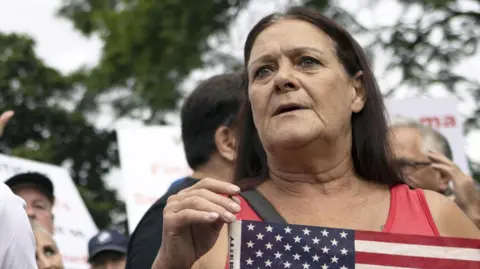The recent developments regarding the immigration policies under President Donald Trump have garnered international attention, particularly concerning the first group of refugees from South Africa. This group consists of 49 white South Africans who have been granted refugee status in the United States, a significant milestone that raises questions about the complexities of race, politics, and humanitarian needs in the context of changing global migration trends.
The refugees departed from Johannesburg, heading to the United States amidst rising tensions between South Africa and the US, spurred by Trump’s controversial declarations that members of the Afrikaner community in South Africa were facing “racial discrimination.” This assertion drew immediate rebuttals from South African officials, including Foreign Minister Ronald Lamola, who asserted that there is no systematic persecution of white Afrikaners in the country. Lamola insisted that any claims made by Trump regarding the treatment of Afrikaners are unfounded, reflecting a deeper misunderstanding of the social dynamics within South Africa.
The South African government has been vocal in its response, emphasizing that allegations of persecution lack the necessary backing to meet the criteria defined under both domestic and international refugee laws. In contrast to Trump’s statements regarding land seizures from white farmers without compensation, South Africa has firmly denied this characterization, insisting the narrative of victimhood is misleading.
Adding to the discourse, the United Nations refugee agency (UNHCR) distanced itself from the resettlement initiative, clarifying its non-involvement in the screening process for these refugees. Furthermore, the US government’s depiction of violence against white farmers has been met with skepticism, as studies indicate that while violence does occur on farms, the majority of the intended victims are farm workers, predominantly black, which adds further complexity to the narrative being portrayed by Trump.
Elon Musk, a prominent South African-born entrepreneur and a key adviser to Trump, has previously voiced claims about a “genocide of white people” in South Africa. However, such statements have raised eyebrows and faced significant scrutiny, with many experts arguing that the allegations are exaggerated and not supported by concrete evidence. Statistics reveal there were only 44 murders reported on farms in 2024, with just eight classified as farmers, further calling into question claims of widespread violence targeting white individuals.
In light of these unfolding events, an international perspective is vital. For example, Max du Preez, a noted Afrikaner writer, has described the assertions made regarding targeted persecution of white South Africans as “absurd,” arguing that such narratives stem from internal political dynamics within the US rather than genuine humanitarian concerns for South Africans. This point exemplifies the increasing complexity of global migration debates, where identity, race, and historical legacies intertwine with contemporary political sessions.
Through the ongoing dialogues between the US and South Africa, a pattern of escalating tensions becomes apparent. Following Trump’s tasking of his administration to explore resettlement for Afrikaners, bilateral relations hit a new low when South Africa’s ambassador to the US, Ebrahim Rasool, was expelled over accusations that the Trump administration was playing on themes of racial victimhood for political gain.
The recent migration of white South Africans to the US exemplifies how immigration narratives are often used in political discourse to mobilize support or to critique immigration laws globally. Current attitudes towards immigration, including the receiving of Afikaner refugees, provokes discussions on the balance between maintaining humanitarian principles and national sovereignty amidst broader crackdowns on immigrant policies.
Overall, the arrival of these 49 refugees in Washington, D.C., followed by relocation to Texas, serves as a focal point for ongoing discussions about race, identity, and migration policies on both national and international stages. With 7.3% of South Africa’s population comprising white individuals who predominantly own the country’s agricultural land, the implications of the US’s acceptance of Afrikaner refugees go beyond mere immigration statistics, intricately tied to historical injustices and contemporary societal dynamics. As the resettlement occurs, it will be observed how these complicated narratives will continue to unfold in public discourse and international relations.



